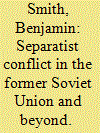| Srl | Item |
| 1 |
ID:
178372


|
|
|
|
|
| Summary/Abstract |
Policymakers and scholars generally assume that, unlike in interstate wars, in civil conflicts opposing forces cannot simply ‘agree to disagree:’ in order to stop fighting, one side must collapse, disarm, or concede. I argue that this assumption largely holds for centre-seeking conflicts, but not for separatist conflicts. Because separatist conflicts involve more geographically contained fighting and more limited stakes, rebels and states can more easily transition into cooperation. To test this argument, I create an original worldwide dataset of long-term truces in civil conflicts (1989–2015). That is, cases in which governments and rebels transition from open fighting to peaceful cooperation for an extended period without either side collapsing, disarming, or conceding. Overall, I find strong support for the main contention: while such truces are exceedingly rare in centre-seeking conflicts, they have happened in more than one-third of separatist conflicts since 1989. Even where rebels are strong or have little public support, separatist aims open space for containment and cooperation. These findings help fill in the empirical gaps between war and peace and document cases of peaceful cooperation without disarmament or political reform. They also highlight key differences between peacebuilding in centre-seeking and in separatist conflicts.
|
|
|
|
|
|
|
|
|
|
|
|
|
|
|
|
| 2 |
ID:
119695


|
|
|
|
|
| Publication |
2013.
|
| Summary/Abstract |
Recent research on separatist nationalism has focused on the most common location of new states in the international system-the postcommunist world. While providing the largest number of cases for exploration, the arguably unique features of the Soviet system may have effects that do not easily translate to other parts of the world. This article reviews a recent set of books that highlights this question, focusing on the legacies of Soviet ethnofederalism in catalyzing secession, separatist war, and nation-state crisis. These books share in common a tendency to deemphasize the historical lineages of separatist nationalism and to focus more proximately on institutions. The article builds on the discussion of recent research by engaging two separate cross-national data sets to explore the role of ethnofederal institutions and of historical legacies. It concludes by arguing for a return to historically situated studies of center-minority conflicts and for greater engagement across regional lines of expertise.
|
|
|
|
|
|
|
|
|
|
|
|
|
|
|
|